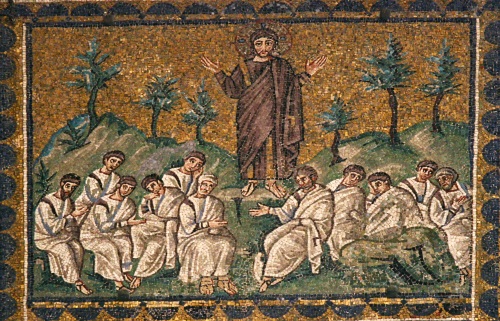IV Pascha Tuesday – John 7: 1-13
Listen to an audio podcast of this post at https://www.spreaker.com/episode/pascha-iv-tuesday-the-world-hates-the-truth–60200621
At that time: Jesus walked in Galilee: for he would not walk in Jewry, because the Jews sought to kill him. Now the Jews’ feast of tabernacles was at hand. His brethren therefore said unto him, Depart hence, and go into Judaea, that thy disciples also may see the works that thou doest. For there is no man that doeth any thing in secret, and he himself seeketh to be known openly. If thou do these things, shew thyself to the world. For neither did his brethren believe in him. Then Jesus said unto them, My time is not yet come: but your time is alway ready. The world cannot hate you; but me it hateth, because I testify of it, that the works thereof are evil. Go ye up unto this feast: I go not up yet unto this feast; for my time is not yet full come. When he had said these words unto them, he abode still in Galilee. But when his brethren were gone up, then went he also up unto the feast, not openly, but as it were in secret. Then the Jews sought him at the feast, and said, Where is he? And there was much murmuring among the people concerning him: for some said, He is a good man: others said, Nay; but he deceiveth the people. Howbeit no man spake openly of him for fear of the Jews.
These men, our Lord’s own relatives, who did not believe in Him, spoke mockingly because they were dominated by the spirit of this world. So too, to this day, those who are worldly minded will mock the true followers of Christ, and the world – that is, the society of fallen man, under the domination of Satan – will persecute them. Here is what St. Theophan the Recluse says about this:
“The world cannot hate you; but me it hateth, because I testify of it, that the works thereof are evil (John 7:7).” The Lord did not say this to His disciples; to His disciples He foretold later that the world would hate and persecute them also, because He has taken them out of the world. So, note what the world hates, and you will learn of Christ’s lot. The world rebels most strongly against what is of Christ, what is closest to Him, and more like unto His spirit. This is an external indicator, but for those who live externally this is enough. The world does not act on its own, but is kindled in its works by its prince—satan, the works of whom the Lord destroyed, and continues to destroy in believers and with believers. He cannot do anything to the Lord directly; this is why he directs his anger upon those who believe in Him, so that in frustrating them he will frustrate the Lord. He does not act directly in this, but through his agencies, which make up the world. This does not mean that he is strong; do not fear him, but rather be bold, for the Lord overcame the world and the prince thereof. Satan is not in a condition to do anything to one who does not yield on his own. – Thoughts for Each Day of the Year, pp. 100-101
We must remember, then, that when worldly people mock our belief and piety – which is especially difficult to bear when they are nominally people who call themselves Orthodox, a situation that is, alas, all too common – we must not direct our anger against them, for they are under the domination of the prince of this world, the devil. They are in big trouble, though they do not know it, or least will not admit it. We must direct our anger against sin, the devil, and the spirit of this world.
St. John Chrysostom interprets the Lord’s rebuke to his unbelieving relatives as a model of meekness and gentleness. The Lord is saying simply, “You cannot understand me, because you belong to this world, not to the world above to which I and my true followers belong.” It is not a railing accusation, just a statement of the truth of the situation. We shall find, also, that if we state the truth firmly but without irritation, this will leave our opponents without an answer, without a pretext for accusing us, and without excuse, while simultaneously preserving the peace of our souls.
Following his usual method, St. Chrysostom follows his doctrinal exegesis of this passage with a moral exhortation in the form a thundering peroration that engraves itself easily on the hearts of his listeners. I shall not quote this passage at length, but here is the conclusion:
Let us then become spiritual, and bridle this dreadful wild beast. Anger differs nothing from madness, it is a temporary devil, or rather it is a thing worse than having a devil; for one that hath a devil may be excused, but the angry man deserves ten thousand punishments, voluntarily casting himself into the pit of destruction, and before the hell which is to come suffering punishment from this already, by bringing a certain restless turmoil and never silent storm of fury, through all the night and through all the day, upon the reasonings of his soul. Let us, therefore, that we may deliver ourselves from the punishment here and the vengeance hereafter, cast out this passion, and show forth all meekness and gentleness, that we may find rest for our souls both here and in the Kingdom of Heaven. To which may we all attain, through the grace and lovingkindness of our Lord Jesus Christ, by whom and with whom, to the Father and the Holy Spirit be glory, now and ever and world without end. Amen.

